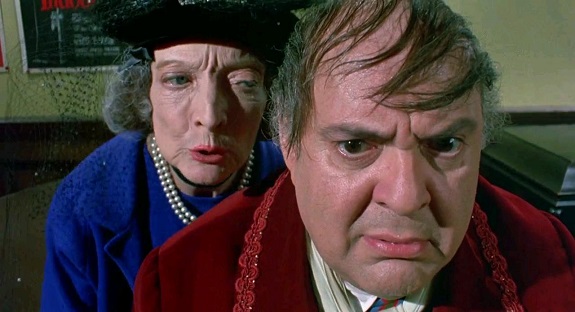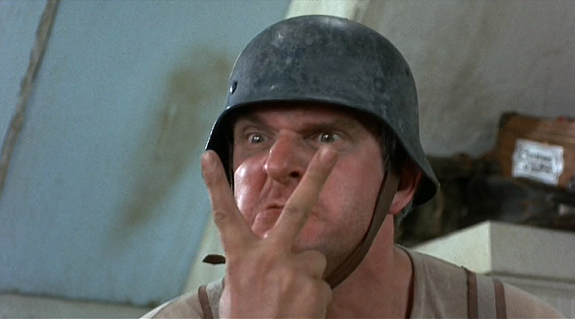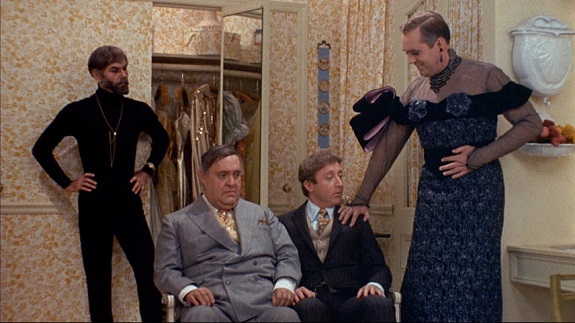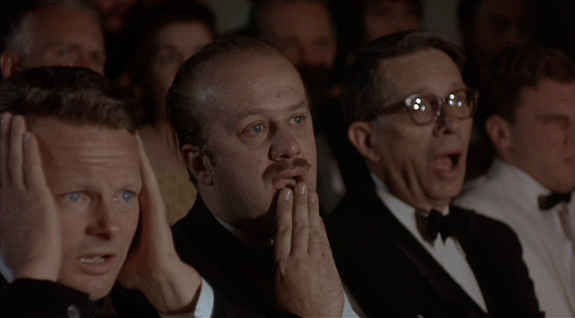This post is part of the Mel Brooks Blogathon, hosted by The Cinematic Frontier. Read the rest of the posts in this tribute HERE!
My mother, who has had a very strong influence on my love of movies, hocked me mercilessly about watching Mel Brooks’ The Producers when I was a teen. At the time there were no Blockbusters or Netflix or VHS or DVDs, so it was not easily available.
The plot she briefly outlined, about a failed producer and a neurotic accountant who hit on a scheme to make more money producing a Broadway flop than a Broadway hit, didn’t strike me as an especially funny premise.
Until this:
“They find a play called Springtime for Hitler, and cast a hippie named LSD as Hitler.”
THAT sounded funny.

When I finally saw it—probably as a rental from Blockbuster—it was way, way, WAY funnier than I could have even imagined. It’s impossible for me to estimate how many times I’ve seen the film. The only Brooks movie that rivals it on my rewatch list is Young Frankenstein. I know entire chunks of dialogue by heart.
This was Mel Brooks’ first movie, which he both wrote and directed. He had no experience directing, and, let’s face it—it kind of shows. He depended quite a bit on his assistant director, Michael Hertzberg. According to the film’s editor, Ralph Rosenblum, the film was saved in the editing room. He and Brooks had many heated arguments about what to keep and what to edit out of the film.
(Brooks clearly felt very strongly about this, as years later he restored several scenes that were edited out of the movie by Rosenblum when he adapted The Producers as a Broadway musical.)

The first section of the film feels very much like a two-character play, as protagonists Max Bialystock (Zero Mostel) and Leo Bloom (Gene Wilder) meet when accountant Bloom comes to do Bialystock’s books. As he arrives, Bloom walks in on Bialistock playing sex games with an elderly lady (Estelle Winwood). Neurotic almost to the point of being non-functional, Bloom is easily brow-beaten by Bialystock to doctor his books when it turns out he raised more money than he needed for his last Broadway production.
Bialystock (supposedly based on a real-life Broadway producer Brooks once knew) is so down and out he must service elderly women sexually in order to raise money for his productions. When Bloom speculates a producer could make more money with a flop than a hit, by raising more money than he needs and not having to pay off the investors when it fails, Bialystock immediately wants to put the plan into action.

They peruse stacks of plays until they find one that is “practically a love letter to Hitler” and is “guaranteed to close on page four.” The author is ex (well, sort of ex)-Nazi Franz Liebkind (Kenneth Mars). Liebkind is thrilled to find out his play will be produced. The next stop is with director Roger De Bris (Christopher Hewett), whose plays “end on the first day of rehearsal.”

The search for someone to play Hitler is a disaster, until a hippie named Lorenzo St. Dubois, or LSD (Dick Shawn), wanders into the auditions by mistake. After he sings a rock song, Bialystock insists to the appalled Liebkind and De Bris “That’s our Hitler! That’s our Hitler!”
Everything seems in place for a successful—er, totally unsuccessful—Broadway premiere. After the opening musical number “Springtime for Hitler” shocks the audience almost into a collective aneurysm, Bialystock and Bloom await the final curtain on their sure-fire flop at a bar across the street. The audience begins to leave the theater, but as the curtain rises on LSD as a beatnik/hippie version of Hitler, they take it as satire and find the show hilariously funny.
During intermission, the giddy Bialystock and Bloom are shocked to hear the bar patrons praise the show. They go across the street and witness the audience delightedly sopping up every moment of the play. Realizing they are going to be charged with fraud, they return to the office and start turning on each other.
There’s a lot of talk about how you “couldn’t make this kind of movie today.” But it was not that long ago that Brooks had great success with the Broadway musical version, which in turn was also made into a movie (which was less successful). Very little was actually changed.

The basic premise—of two losers who try to come out on top and think they’ve done everything to guarantee the success of their plan, only to fail utterly—is still inherently funny. At the time of the film’s release, there were many critics who panned the bawdy and even gross humor. (Though of course much of it seems tame by today’s standards.)
Some might object to the treatment of the sexually voracious little old ladies, but it’s a rare film that even bothers to acknowledge that older women not only like sex, if given the opportunity their sex lives can be very imaginative.
And, yeah, I’m not exactly crazy about Bialystock talking about buying himself a toy with some of the ill-gotten money, and the “toy” turning out to be a voluptuous Swedish girl name Ulla (Lee Meredith). But I get over it when he returns from the successful opening of Springtime for Hitler a ruined man and must refuse Ulla’s blatant request to make love.

In spite of mixed reviews, the film went on to receive several nominations and awards. (Brooks won the Academy Award for Best Original Screenplay; Gene Wilder was nominated for Best Supporting Actor.)
While Brooks reportedly hated Zero Mostel, he got out of him a classic comedy performance. The movie was a star-making turn for Wilder. The relationship between Bialystock and Bloom is the first of several male partnerships in Brooks movies that blossom into real friendship.

Let me tell you this (and you’re hearing it from the horse): this is still a really funny movie, even though Brooks made it with almost no experience directing a movie. He hated his star. He had big fights with his editor. The movie almost died on opening night, the way Bialystock and Bloom hoped Springtime for Hitler would die on opening night. Its appeal has lasted so long no doubt Brooks wonders to this day:
“Where did I go right?”

Oh, this one I can’t pass up at all when it’s on TCM, and I have to remember NOT to make popcorn or try to eat or drink anything while watching or else it ends up trying to kill me when I choke or gets projected across the room from me laughing so hard.
Definitely NOT a popcorn-eating movie! I can’t pass it up, either. Truly, I picked it for my topic just to give me an excuse to watch it again!
I adore this film, and I especially love your description of your mother “hocking” you about it. We use that Yiddishism in my family too.
LOL, it’s the best way to describe it. Any time Mel Brooks came up, she’d start saying, “You haven’t seen The Producers yet! You have to see The Producers!” 🙂
Perfect summation of a hilarious movie. Glad you endured all the hocking to see it.
Thanks! It was worth it in the end. 🙂
I’ve only seen this once, late at night (and drunk to boot). I barely remember much of it, (except for Dick Shawn for some reason, but he always comes off as memorable…see “It’s A Mad, Mad, Mad, Mad World”) Time to watch it again. Good review.
LOVE Dick Shawn. I was fortunate enough to see him perform live once. He was so inventive and so hilarious. My theory for why they cut LSD from the Broadway version is because no one could replace him!
Does anyone know the real name and artist for the song Oola dances to?
This movie was a staple of UHF TV in Philly in the early 70’s – and my dad, who did not laugh at much of anything, thought it was hilarious – I was probably right around 10 or 11 – and I thought so too. God bless UHF Channels 17, 29, and 48